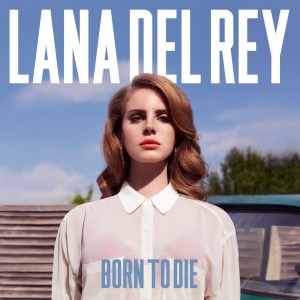LANA DEL REY
Born To Die (Universal)
It`s difficult to remember a debut album more incessantly hyped in recent times than American singer Lana Del Rey`sBorn To Die. With the notable exception of Lady Gaga, it`s also difficult to remember an aspiring starlet who has more thoroughly reinvented herself, both physically and musically. Like Gaga, she has thrown of the shackles of a failed career gigging as a singer in the bars and clubs of New York City, emerging with a new name, a new look, and an entirely new sound. Del Rey – whose real name is Elizabeth “Lizzy” Grant – released a 2010 debut album on an indie label. It failed to snag her a major label recording deal and was available on i-Tunes for only a couple of months before mysteriously vanishing into the musical ether. She`s since purchased the rights to the album and plans to capitalise on her current phenomenal success by re-releasing the recording sometime this year.
A cynic, of course, might say that it disappeared for good reason. Complete re-creation is far easier without pesky recordings from your past dogging your every step toward the limelight. Reinvention achieved, Del Rey became a near-overnight sensation with the late 2011 release of ’Video Games,` a languid pop number in which her coquettish drawl took centre stage. In weeks she went from being an under-the-radar niche artist to a fully-fledged mainstream starlet. She was, with her limpid eyes, pale-lipped pout and jewel-encrusted acrylic nails a curious amalgam of urban modernity and a throwback to another, more glamorous, era.
Almost immediately, the 25-year-old was the subject of near-constant online discussion and speculation, acclaimed by some as a torch singer for a new generation and derided by others as little more than a callow, empty-eyed ing nue. Rumours abounded. One day she was the daughter of a millionaire father who was funding her musical reinvention and the next she was the creation of savvy record company executives. Whatever the story, Del Rey is, for better or worse, a contrivance and a construction. Gaga, also 25, might have morphed from the shy, frequently bullied private-school educated piano prodigy Stefanie Germanotta into the living, breathing embodiment of continually evolving performance art, but both her recordings and live performances have shown her to be much more than the mere triumph of style over substance. Del Rey`s debut, sadly, puts her in no such position.
Costumes, pop pageantry and salacious back-stories aside, it`s ultimately the music that matters most, isn`t it? Del Rey has repeatedly described herself as “a self-styled gangsta Nancy Sinatra.” She is, she`d have us believe, part Sinatra-inspired pop crooner and part purveyor of more urban sounds. Listening to the 15 songs that comprise her over-long debut, one realises how accurate that description is, though not in an especially impressive or complimentary manner. On almost every song, she aims for homage and instead ends up mired in pastiche. Her drawn-out, languorous vocals might have seemed interesting, even original, when ’Video Games` was first released, but, over the course of an entire album, they`re repetitive and grating.
The Lana Del Rey who sings of her life on Born To Die is unabashedly fixated on two things: the trappings and privileges of wealth and the all-consuming love she feels for her drug-addled boyfriend. Her songs weave a tale that is ultimately shallow and troubling, switching between breezy California pop and attempts at a harder-edged, more urban-inspired sounds. Scratch the surface of the lyrics and the gender politics of the songs, too, are problematical. To some listeners, none of this will matter. And it`s perhaps pertinent to ask: even if Del Rey is nothing more than the performance persona of Lizzy Grant, what does it matter? It`s all about the music, right? And, if the songs are good, they`ll argue, what does it matter if, on closer inspection, they`re little more than simpering, shallow odes to the persona she`s crafted, replete with an all-consuming, destructive love affair, drinking in New York City`s hippest bars and partying hard in The Hamptons, that beachside enclave where the city`s rich and famous spend their summers?
It matters, I’d argue, because this is a record that is not only almost entirely predicated upon the successful execution of Del Rey’s persona but is also entirely comprised of songs that chronicle various aspects of inhabiting that self. The success of Born To Die hinges on how successfully she convinces us that the world about which she sings is actually hers and how successfully she convinces us that she has inhabited and experienced it, regardless of whether or not the chanteuse we see before us is Grant truly reborn or simply playing dress-ups.
Del Rey`s record company, clearly keen for their doe eyed ingenue to appeal to as many listeners as possible, has had a hand in crafting a collection of songs that attempt myriad genres but lack cohesion. There’s the now well-known pop of ’Video Games` and its simpering, faux-seductive follow-up, ’Blue Jeans,` but there’s also the slick, soulless pop of ’Radio,` on which she sings: Pick me up and take me like a vitamin / ’Cause my body`s sweet like sugar venom / Baby, love me ’cause I’m playing on the radio / How do you like me now?
These are songs that swing wildly between genres and rarely succeed in successfully recreating any of them. There are military drums, hip-hop beats, the soft swirls of electronica and soaring strings. She takes a half-hearted stab an homage to rap on ’To The Races,` but it’s cringe-worthy in almost every regard — her vocal delivery is all contrived coyness, her rapping sounds more like hiccupping, and the lyrics are embarrassingly debasing: Light of his life, fire of his loins / Keep me forever, tell me you own me / Light of your life, fire of your loins / Tell you own me, tell me you own me / Tell me I`m yours.
Money, status and a pathetic, all-consuming need to be adored are what characterise the rest of the album’s songs. ’Diet Mountain Dew,` ’Dark Paradise` and ’This Is What Makes Us Girls` all aim, in varying ways, for swooping, soaring pop, but are instead largely both uninspired and unimaginative. Del Rey croons her way through them, emptily delivering yet more vacuous, amateurish lyrics and singing in her signature soporific drawl. One US critic described her, albeit rather unkindly, as sounding like “a duck on Quaaludes” and he wasn’t far wrong. She sings as though she`s downed a handful of Valium and then decided to go ahead and hit the recording studio regardless.
By the time the last track has finished, frankly, it`s difficult not to feel as though you need to shake yourself from a stuporous fugue state. There`s also the issue of the album`s lyrics. On the songs where Del Rey seemingly steps out of character, as on ’Carmen,` a portrait of a teenage girl caught up in a relentless cycle of partying hard, she’s a little more convincing than elsewhere, but barely. Hers are songs that eschew the vagaries of simple puppy love or mooning devotion to skip straight to instead being paeans to outright desperation. It’s difficult not to want to grab her by the shoulders and shake her out of her ridiculously desperate and obsessive romantic reveries.
Practically every song on Born To Die features some dreadful, desperate plea for her boyfriend, whom she describes as a man with “the beat of a cocaine heart,” to stay by her side. ’Blue Jeans` boasts the line I would love you till the end of time / I would wait a million years and that, sadly, is indicative of the general mood and tone that permeate this album. Hell, she`s willing to commit suicide for love, pondering what heaven might be like, only to reconsider because there`s a chance her boyfriend won’t be there to greet her at the pearly gates, and on ’China Doll` she sings with all the complexity and interiority of, well, a blank-faced doll: Boy, you’re so dope, your love is deadly / I’m nothing without you / All my dreams and all the lights mean / Nothing without you.
On ’Radio` Del Rey repeatedly sings ’Now I`ve finally found it.` Given that the song addresses both fame and love, it`s difficult to know whether she`s referencing having finally secured her man`s undying love, the adulation she so desperately craves, or both. Either way, Born To Die is a collection of songs that is far less interesting and engaging than the creation myth dogging its creator. For all of her pouting and posturing, mimicry and desperate emoting, Del Rey is little more than a woman whose public persona, whatever its origins, is far more intriguing than the forgettable songs this album comprises.
[rating:2/5]
Heidi Maier.




